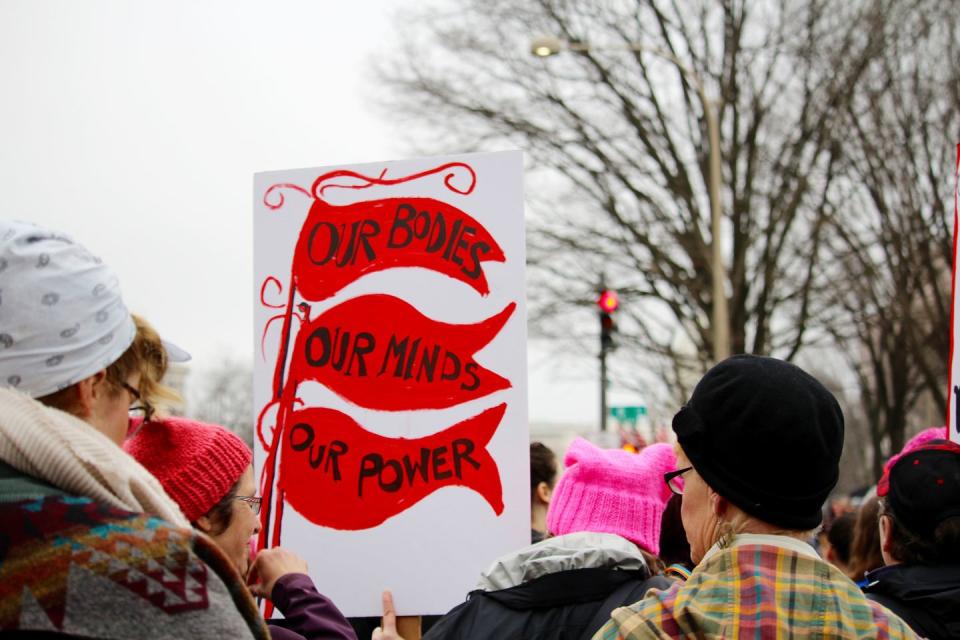What to Know About the Mississippi Supreme Court Abortion Case That Challenged ‘Roe v. Wade’
Today marked an enormous day for the future of reproductive rights and bodily autonomy in the United States after the Supreme Court officially overturned Roe v. Wade, the nearly 50-year-old case that made abortions a constitutional right. Now, the landmark case is no longer the law of the land, and instead, individual states are able to impose their own abortion laws.
But you may be wondering how exactly did we get here? Well, after an alarming abortion ban was passed in Texas in the fall that forbids abortions after the six-week mark (making the time frame for pregnant patients to get an abortion less than two), the Supreme Court heard a similar law in December proposed by Mississippi that wanted to aggressively restrict abortion access in the state, and ultimately, overturn Roe. This case is known as Dobbs vs. Jackson Women’s Health Organization.
The ruling of this case changed the future of Roe v. Wade, now making it a significant part of our country’s history. Here’s everything you need to know about the case, the court proceedings, what the laws and challenge were, and what this means for abortion rights in the United States moving forward.
Real quick, can you go over the basics of Roe v. Wade so I understand what exactly was taken away?
Gladly. Roe v. Wade was the case in 1973 in which the Supreme Court held there is a constitutional right to abortion and banned states from prohibiting abortion procedures before a fetus was deemed viable, which the law determined was around 23 or 24 weeks. The essence of Roe v. Wade boiled down to this: Anyone who is pregnant is given the opportunity to decide for themselves if they’d like to continue with the pregnancy before it reaches viability. (FYI, “viable” just means how old a fetus is before it can live outside the womb, which is about 24 weeks.)
Despite the law already giving clarity on what viability is, there has been an ongoing, decades-long bioethics debate on what exactly makes a pregnancy “viable,” and some states—particularly those that have a conservative majority—push this notion to create a gray area.

So what law from Mississippi was argued to the Supreme Court?
The Gestational Age Act that was signed in March 2018 by Mississippi Governor Phil Bryant is what was on the table. This bill was intended to prohibit all abortions in the state once a pregnancy was beyond 15 weeks. Before this, Mississippi allowed abortions to take place until a pregnancy reached 20 weeks, which was an outlier compared to the 24-week limit most other states allowed. Governor Bryant said he was “saving the unborn” by signing the bill into law. This proposed bill from Mississippi, at the time, did make special cases and exceptions for “a medical emergency, or in the case of a severe fetal abnormality,” yet it didn’t make any allowances for instances of pregnancies that resulted from a rape or incest.
Jackson Women’s Health Organization, the only abortion clinic in the entire state of Mississippi, quickly challenged the bill and sued the state in conjunction with the Center for Reproductive Rights (the organization that actually argued at the Supreme Court). The suit went to the United States District Court for Mississippi’s Southern District, which resulted in a federal judge pausing the bill from being passed. Several months later in November 2018, another judge officially shut the bill down and even called the state’s “professed interest in ‘women’s health’...pure gaslighting.”
But by June 2020, the state of Mississippi fired back by sending an appeal to the Supreme Court for the Gestational Age Act to be reviewed by the top court. Nearly a year later in May 2021, the Supreme Court agreed to hear the state out. By the first few days of December 2021, oral arguments for the case had concluded and the verdict was left to be determined by SCOTUS.
Okay, so what exactly happened in the Supreme Court trial?
Oral arguments began in December for the case, which is Dobbs v. Jackson Women’s Health Organization (Thomas Dobbs is Mississippi’s health officer and is named as the case’s petitioner). Basically, Mississippi wanted to uphold its ban from the bill that was passed in 2018, and then some. According to the brief, Mississippi wanted to be able to “prohibit elective abortions before viability if it does not impose a substantial obstacle to ‘a significant number of women’ seeking abortions.” In short, the state wanted the Supreme Court to overrule Roe v. Wade as well as the 1992 Supreme Court decision in Planned Parenthood v. Casey that says “a State may not prohibit any woman from making the ultimate decision to terminate her pregnancy before viability.”
Was SCOTUS always likely to rule against Roe v. Wade in this case?
Essentially, yes, especially considering the makeup of the justices. Six of the nine Supreme Court justices are conservative, three of whom were appointed by former President Donald Trump, and they tend to have ruthless perspectives when it comes to abortion rights. The final ruling on Dobbs, which ultimately overturned Roe, was 6-3.

Additionally, some believed that because the case was held for a year by the Supreme Court, that it likely was going to rule in favor of Mississippi since making the same decision as the lower courts wouldn’t make as much sense so far along. Plus, the Supreme Court has overturned many of its own rulings in the past. Furthermore, early reports said that “several of the conservative justices appeared ready to go further and overrule Roe entirely, letting states decide whether and when to ban abortions,” according to the New York Times.
So now what? What will happen to abortion rights in the United States?
Since the Supreme Court ruled in favor of Mississippi, basically there are several other states that are immediately able to follow suit by outlawing abortion completely or placing super-strict abortion laws on its residents. These are called trigger laws—Arkansas, Idaho, Kentucky, Louisiana, Mississippi, Missouri, North Dakota, South Dakota, Tennessee, Utah, and Texas have these laws in place, according to Guttmacher Institute.
That said, there are 15 states plus the District of Columbia that do protect abortion rights despite Roe v. Wade being overturned.
In general though, the post-Roe future is pretty bleak. Not only can states enforce abortion bans, but doctors who provide the medical procedure can be sued and imprisoned, as well as those who receive it. Laws connected to Roe, like same-sex marriage and permitting forms of birth control could potentially be at risk too.
What can I do to help?
There are reproductive rights organizations fighting against forced pregnancies that could use your financial support. Here are a few standouts:
You Might Also Like

